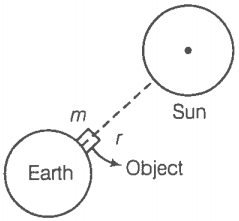Hint: Use Newton's law of gravitation.
Step 1: Find the force on an object on the surface of the Earth.
Given, ‘G’=10G
Consider the adjacent diagram.
Force on the object due to the earth]
Force on the object due to the sun,
As r>> R(radius of the earth) F will be very small.
So, the effect of the sun will be neglected.
Now, as g' =10 g
Hence, weight of person = mg' = 10mg [from Eq.(I)] i.e. gravity pull on the person will increase. Due to it, walking on the ground would become more difficult.
Step 2: Find the terminal velocity of the raindrops.
Critical velocity is proportional to g' i.e. .
As g'>g
Hence, raindrops will fall much faster.
Step 3: Find the effect of the gravitational pull on the aeroplanes.
To overcome the increased gravitational force of the earth, the aeroplanes will have to travel much faster.

